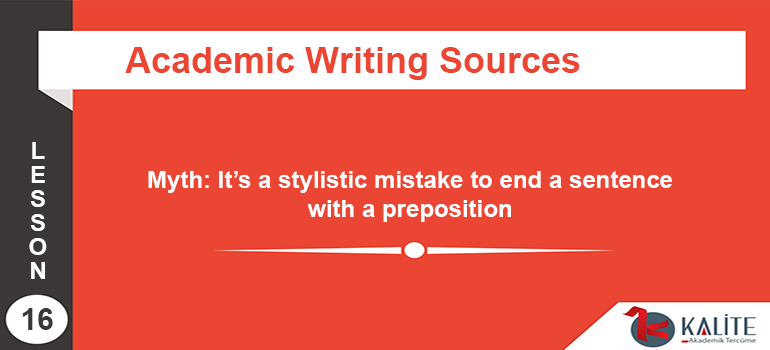
Myth: It’s a stylistic mistake to end a sentence with a preposition
Prepositions (e.g. in, on, to, about, as, of, ) show the relationships between things, and the notion that no self-respecting writer ends a sentence with a preposition has been discussed at length. You will get this advice only in the form of prescriptive advice, and it presents an instance in which dogma, rather than careful consideration, seems to be the foundation of the rule.
Examples of sentences ending on prepositions:
“She has not much evidence to go on.”
“The shuttle is having difficulty taking off.”
Of this supposed stylistic rule, my Merriam Webster’s English Usage Dictionary notes, “not only do the commentators reject the notion, but actual usage supports their rejection.”
In other words, even the best writers—among them Shakespeare, Jane Austen, James Joyce, Stephen Leacock, and many more—sometimes end sentences with prepositions, so you should not feel ashamed to do so yourself.
Like most well-known writing rules, though, the basic intuition is well founded. A sentence is sometimes poorly served by the writer that has it end on a preposition.
Sentence emphasis tends to fall at the ends of sentences, so you must consider whether the preposition is usefully emphasized—if not, the sentence may be best rephrased. Consider the following, for example:
Rephrasing to avoid the ending-preposition
“She has not much evidence to go on.” à “She has not much evidence on which to go.”
The rhythm of this rephrasing puts the emphasis on the action (“go”) rather than its preposition, and for this reason it might be preferable, even if the writing style becomes a bit stuffy.
Unnecessary rephrasing
On the other hand, sometimes rephrasing will be unnecessary, depending on your meaning. Consider, for example, our other example from above:
“The shuttle is having difficulty taking off.” à “The shuttle’s launch is facing difficulty.”
These two sentences have different points of emphasis, but each is suitable for a certain purpose.
The first emphasizes the preposition,1 thus the stage of the launch (taking off), while the second emphasizes the difficulty. Neither is superior in its emphasis, only different.
1) This preposition is more properly called a “particle” here because it forms a part of a “phrasal verb” (taking off), but this terminological distinction does not bear much on the writing advice myth we’re thinking about, so we can safely think of “off” as a regular preposition here.
This article is part of Writing myths: The reasons we get bad advice.


